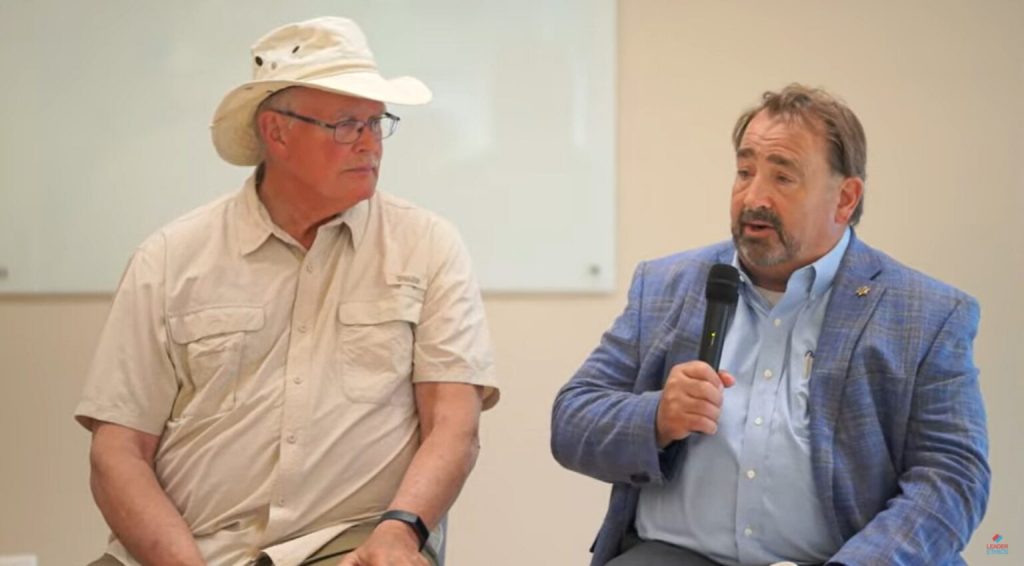Republican and Democratic Retirees Jointly Promoting ‘Fusion Voting’
Proposal would allow 'third parties' to back major candidates, have more influence.

Former state Sen. Dale Schultz, left, listens as former Dane County Sheriff Davd Mahoney speaks in a panel discussion on “fusion voting” in La Crosse Wednesday. (Screenshot/LeaderEthics Wisconsin YouTube channel)
Could letting multiple political parties endorse the same candidate bring political reform to Wisconsin, or the nation?
That’s part of the idea being promoted by a bipartisan pair of retired politicians — former state Sen. Dale Schultz, a Republican, and former Dane County Sheriff Dave Mahoney, a Democrat.
Mohoney and Schultz believe that “fusion voting” — a system that allows multiple parties to endorse the same political candidate — could help remedy the disaffection with politics that they see becoming ever more widespread.
Talking with his two adult sons over the weekend, “both of them told me, ‘I don’t vote. I’m not going to vote because my voice doesn’t matter,’” Mahoney said during a panel discussion in La Crosse on Wednesday. “Unfortunately I hear that all too often.”
In his conversations in the community, “a consistent message was, ‘I’m not being represented by my party,’” Mahoney said.
Schultz and Mahoney have established United Wisconsin — for now, an affinity group, but in the future, they hope, a new political party.
Wednesday’s panel discussion provided a platform for the pair to make their case for fusion voting to a few dozen people at the Black River Beach Neighborhood Center in La Crosse and a broader audience watching on YouTube. It was hosted by LeaderEthics Wisconsin, a nonpartisan, nonprofit organization that defines its purpose as “promoting ethical leadership among elected officials.”
Making it possible for candidates to run on more than one party line would strengthen the power of third parties and give them “a seat at the table” as candidates and officeholders shape public policy, Schultz said. “We can provide agency so that their voices are heard, that they do have the ability to negotiate.”
As a state lawmaker he sought to work across party lines “in a collaborative way that would best serve all of us,” Schultz said. Disagreements were common, “but we didn’t hate each other. And at the end of the day, we were proud when we could jointly stand up in front of our constituents or the public in general and say we have a solution which we think is worth trying.”
That sense of comity has deteriorated, Schultz said. He believes fusion voting could help restore a stronger spirit of cooperation and re-engage “those who don’t believe anyone is listening to them, those who believe that the only choice they have is … voting for the lesser of two evils, voting for a third party and throwing away their vote, or simply not voting at all.”
Chapter 8 of the Wisconsin statutes has two laws that ban candidates from running on more than one party’s ticket. Statute 8.03(1) states that a candidate’s name may not be listed on the ballot more than once. Statute 8.15(1) bars candidates from running in more than one party’s primary election at the same time.
Changing those laws is at the top of United Wisconsin’s agenda. The organization, along with Schultz and Mahoney and three other people described as potential members of United Wisconsin, are suing in Dane County circuit court to have the two statutes thrown out.
The lawsuit declares that the laws violate rights guaranteed under the Wisconsin Constitution to freedom of association and speech, equal protection under the law, and free government. The plaintiffs are represented by Law Forward, the nonprofit law firm that focuses on voting rights, democracy and related issues.
“We should not have the dominating party squeeze out the input from the third parties, and we should not have the voters that are inclined to vote in independent ways to also be squeezed out by the two major parties,” said Lee Rasch, executive director of LeaderEthics Wisconsin, as he introduced the discussion. Rasch is one of the other plaintiffs in the lawsuit.
Mahoney said United Wisconsin aims to cool down the increasingly hostile rhetoric between political parties.
“I care what’s important to us as Wisconsinites,” he said. “I care what’s important to us as Americans. We have far more in common than we have separating us.”
Mahoney said he’s alarmed by the increasingly hostile political rhetoric as well as threats and acts of political violence, such as attacks on two state lawmakers in Minnesota and their spouses, killing one of them and her husband.
“I’ve had many calls myself from current lawmakers who want my thoughts on their safety and what they do to protect themselves from a security standpoint being out in the public,” Mahoney said. “That should never happen. That should never happen in our democracy.”
Schultz and Mahoney said if the lawsuit succeeds in throwing out the two statutes United Wisconsin would become a standing political party and work to build a support base. The party would negotiate with candidates to adopt compatible policy positions in return for the party nominating one of the candidates to run on its own ticket.
Mahoney said that having to compete for a block of voters from a third party “might actually bring some common sense into the positions of both major parties and moderate them and certainly the rhetoric that they send out to their members and constituents.”
The spirit of fusion voting has a long and honorable history in Wisconsin, Schultz said, with the Republican Party at its founding in Ripon in 1854 bringing together a collection of splinter political parties united in their opposition to slavery.
The state laws that bar the practice were enacted in 1897. Historian Josh Kluever, a lecturer at Alvernia University in Reading, Pennsylvania, told the Wisconsin Examiner that the law was likely written in reaction to the 1896 presidential election, when both the Populist Party and the Democratic Party endorsed William Jennings Bryan.
Kluever is from Wisconsin and has written about the history of collaborative politics in the state involving the Socialist Party and Robert La Follette’s Progressive Republican wing and later Progressive Party.
While fusion voting was formally outlawed in Wisconsin, the two groups worked to accomplish similar objectives, he said in an interview, allying to pass legislation and refraining from running candidates against each other.
Currently, only New York and Connecticut have any form of fusion voting. Kluever said that it’s “tricky to predict” how more widespread fusion voting might change political dynamics in a state or the country.
Nevertheless, “it is a positive for the small-d democratic process to have people’s voices feel that they’re being heard,” Kluever said.
Republican and Democratic retirees team up to promote ‘fusion voting’ was originally published by the Wisconsin Examiner.
If you think stories like this are important, become a member of Urban Milwaukee and help support real, independent journalism. Plus you get some cool added benefits.





















Thank you for brining a possible solution to the huge problem we are now facing in Wisconsin and this County as a whole!
Interesting solution – – could be worth a try or at minimum, exploration.